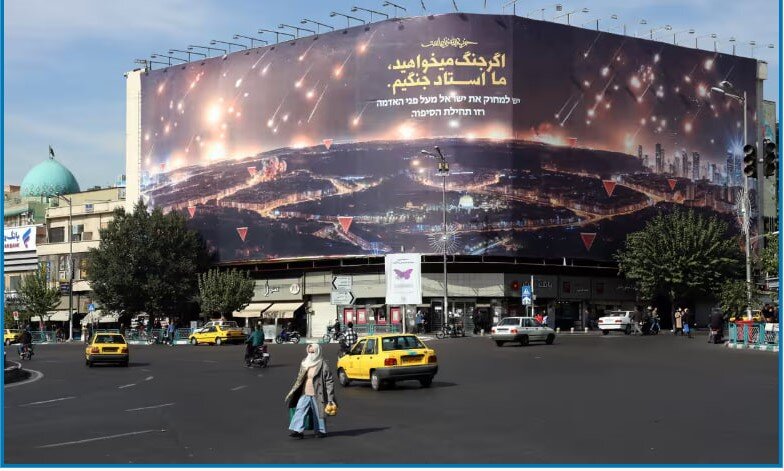Iran's storm looming
Israeli regime attacks Iran’s soil ignoring warnings that any aggression would draw a harsh response

TEHRAN – As the sun rose over Iran, citizens scoured their cities for signs of damage from Israel's early Saturday attacks. What they found was a visible absence of damage on the ground.
"I was jolted awake twice last night," said Ali, a young office worker, as he navigated the streets of central Tehran on his way to work. "The sounds were really loud, first around 2 am and then again around 5 am. I checked my phone and saw a video of Iranian air defense missiles intercepting something in the sky. I expected to see some damage when I left for work this morning, but there's nothing."
Ali, like many others in Tehran, was only aware of the confrontation with Israel due to the activation of Iran's air defense systems. Despite reports of attacks on locations in Tehran, Khuzestan, and Ilam provinces, the bustling neighborhoods remained eerily untouched by any visible destruction. "I'm actually a bit surprised by how limited the impact of the Israeli attacks was," said Ali. "They had been threatening us for weeks. I don't know if we're just that strong, or they're just that weak."
For Iran’s military personnel, the night was more challenging than it was for the citizens. The Iranian Army, the main force responsible for the nation's defense systems, announced the loss of four servicemen who were martyred defending against the strikes.
How did Israel attack Iran?
Iranian authorities revealed details of the Israeli airstrikes on Saturday evening, stating that Israeli fighter jets launched an attack from Iraqi airspace, approximately 100 kilometers from the Iranian border. According to the statement released by the Iranian Armed Forces, the Israeli jets fired several long-range missiles equipped with cluster warheads at Iranian border radars. The majority of these missiles were intercepted by Iranian defense systems. While the jets attempted to enter Iranian airspace, they were unsuccessful. The statement further reported that some Iranian border radars were damaged in the attack but are undergoing rapid repairs.
Israel itself has not published any details on the nature of its attacks. Israeli military spokesperson Daniel Hagari merely confirmed that military sites inside Iran were being targeted shortly after the attacks began. He later claimed the attacks were “successful”, without providing any evidence.
In photos released by Hebrew media, War Minister Yoav Gallant was seen standing in front of a TV screen displaying a picture from a 2021 Iranian oil refinery explosion while assessing the attacks. Meanwhile, Prime Minister Benjamin Netanyahu appeared tired and disappointed in images showing high-ranking Israeli officials gathered in an underground shelter during the early hours of Saturday. The disconnect between the bravado of the initial announcement and the subdued mood captured in these images has further fueled speculation that Israel could not achieve what it had hoped for during its risky night against Iran.
While American news site Axios reported that Israel had originally planned a "limited" attack against Iran, analysts believe these reports are an attempt to salvage the regime's reputation following weeks of saber-rattling and a night of apparent failure.
"After weeks of psychological warfare and threats of a devastating, surprise attack targeting everything from nuclear facilities to oil infrastructure and even assassinations of officials, the Israeli operation ultimately amounted to mostly unsuccessful strikes on just a few military sites," said Ehsan Salehi, a West Asia analyst and CEO of a leading Iranian newspaper. "The world watched as Iran successfully targeted Israeli assets and then effortlessly defended its own territory against the subsequent response. This outcome is undoubtedly a difficult pill for both the West and Israel to swallow."
Israel's attack on Iran came 25 days after a volley of approximately 200 Iranian ballistic missiles rained down on the occupied territories. The strikes sent Israelis scrambling for shelters for hours, and social media was flooded with footage of dozens of Iranian missiles successfully hitting targets within the occupied territories. This attack, dubbed "Operation True Promise II," marked the second direct strike against Israel by Iran. The first, "Operation True Promise," which occurred in April, went largely unanswered.
What’s next?
Iranian officials warned multiple times in the past weeks that any sort of attack against Iranian interests would elicit a harsher response from Tehran. Leader of the Islamic Revolution Ayatollah Seyyed Ali Khamenei who appeared in a large public gathering a few days after the execution of Operation True Promise II said during his public address that Iran would repeat similar operations against Israel if necessary. “[Our response] will neither be hasty, nor delayed,” the Leader announced. Analysts and the public seem to be more or less of the same mind as Ayatollah Khamenei.
"We shouldn't dismiss this attack simply because there wasn't widespread damage," said Ali Abdi, an expert on Israel. "Israel planned and executed a major operation. The reason it failed was the strength of our defense systems. If the regime had achieved its objectives, there would have been a catastrophic impact on Iran."
The expert added that Israel has crossed a new redline with its attack, and needs to be held accountable for what it did. "They directly attacked our soil for the first time and killed four of our soldiers. They must face consequences for their actions, otherwise, attacks on Iran will occur again in the future."
Leave a Comment